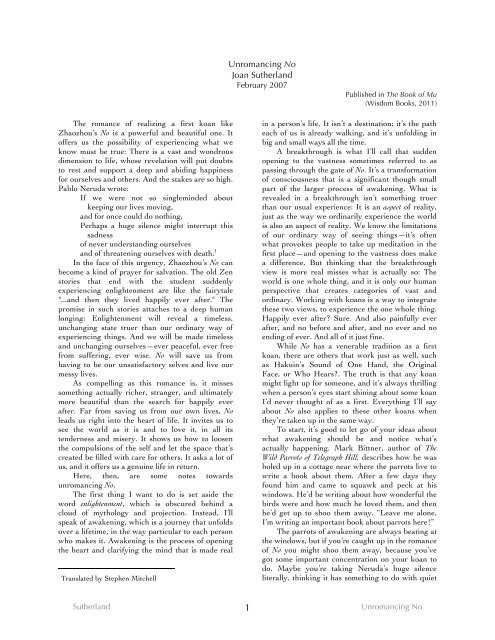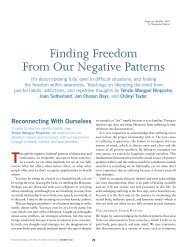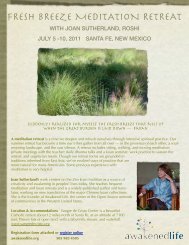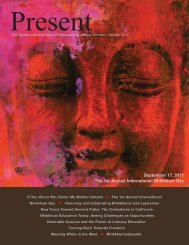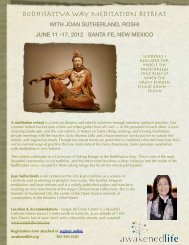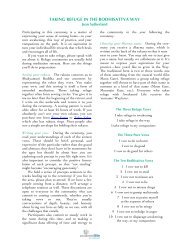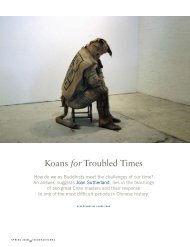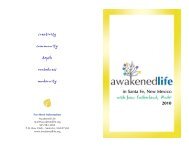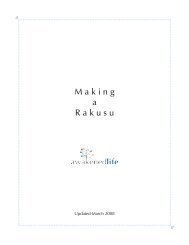Unromancing No Joan Sutherland - Awakened Life
Unromancing No Joan Sutherland - Awakened Life
Unromancing No Joan Sutherland - Awakened Life
You also want an ePaper? Increase the reach of your titles
YUMPU automatically turns print PDFs into web optimized ePapers that Google loves.
<strong>Unromancing</strong> <strong>No</strong><br />
<strong>Joan</strong> <strong>Sutherland</strong><br />
February 2007<br />
Published in The Book of Mu<br />
(Wisdom Books, 2011)<br />
The romance of realizing a first koan like<br />
Zhaozhou’s <strong>No</strong> is a powerful and beautiful one. It<br />
offers us the possibility of experiencing what we<br />
know must be true: There is a vast and wondrous<br />
dimension to life, whose revelation will put doubts<br />
to rest and support a deep and abiding happiness<br />
for ourselves and others. And the stakes are so high.<br />
Pablo Neruda wrote:<br />
If we were not so singleminded about<br />
keeping our lives moving,<br />
and for once could do nothing,<br />
Perhaps a huge silence might interrupt this<br />
sadness<br />
of never understanding ourselves<br />
and of threatening ourselves with death. 1<br />
In the face of this urgency, Zhaozhou’s <strong>No</strong> can<br />
become a kind of prayer for salvation. The old Zen<br />
stories that end with the student suddenly<br />
experiencing enlightenment are like the fairytale<br />
"...and then they lived happily ever after." The<br />
promise in such stories attaches to a deep human<br />
longing: Enlightenment will reveal a timeless,<br />
unchanging state truer than our ordinary way of<br />
experiencing things. And we will be made timeless<br />
and unchanging ourselves—ever peaceful, ever free<br />
from suffering, ever wise. <strong>No</strong> will save us from<br />
having to be our unsatisfactory selves and live our<br />
messy lives.<br />
As compelling as this romance is, it misses<br />
something actually richer, stranger, and ultimately<br />
more beautiful than the search for happily ever<br />
after. Far from saving us from our own lives, <strong>No</strong><br />
leads us right into the heart of life. It invites us to<br />
see the world as it is and to love it, in all its<br />
tenderness and misery. It shows us how to loosen<br />
the compulsions of the self and let the space that’s<br />
created be filled with care for others. It asks a lot of<br />
us, and it offers us a genuine life in return.<br />
Here, then, are some notes towards<br />
unromancing <strong>No</strong>.<br />
The first thing I want to do is set aside the<br />
word enlightenment, which is obscured behind a<br />
cloud of mythology and projection. Instead, I’ll<br />
speak of awakening, which is a journey that unfolds<br />
over a lifetime, in the way particular to each person<br />
who makes it. Awakening is the process of opening<br />
the heart and clarifying the mind that is made real<br />
1<br />
Translated by Stephen Mitchell<br />
in a person’s life. It isn’t a destination; it’s the path<br />
each of us is already walking, and it’s unfolding in<br />
big and small ways all the time.<br />
A breakthrough is what I’ll call that sudden<br />
opening to the vastness sometimes referred to as<br />
passing through the gate of <strong>No</strong>. It’s a transformation<br />
of consciousness that is a significant though small<br />
part of the larger process of awakening. What is<br />
revealed in a breakthrough isn’t something truer<br />
than our usual experience: It is an aspect of reality,<br />
just as the way we ordinarily experience the world<br />
is also an aspect of reality. We know the limitations<br />
of our ordinary way of seeing things—it’s often<br />
what provokes people to take up meditation in the<br />
first place—and opening to the vastness does make<br />
a difference. But thinking that the breakthrough<br />
view is more real misses what is actually so: The<br />
world is one whole thing, and it is only our human<br />
perspective that creates categories of vast and<br />
ordinary. Working with koans is a way to integrate<br />
these two views, to experience the one whole thing.<br />
Happily ever after? Sure. And also painfully ever<br />
after, and no before and after, and no ever and no<br />
ending of ever. And all of it just fine.<br />
While <strong>No</strong> has a venerable tradition as a first<br />
koan, there are others that work just as well, such<br />
as Hakuin’s Sound of One Hand, the Original<br />
Face, or Who Hears?. The truth is that any koan<br />
might light up for someone, and it’s always thrilling<br />
when a person’s eyes start shining about some koan<br />
I’d never thought of as a first. Everything I’ll say<br />
about <strong>No</strong> also applies to these other koans when<br />
they’re taken up in the same way.<br />
To start, it’s good to let go of your ideas about<br />
what awakening should be and notice what’s<br />
actually happening. Mark Bittner, author of The<br />
Wild Parrots of Telegraph Hill, describes how he was<br />
holed up in a cottage near where the parrots live to<br />
write a book about them. After a few days they<br />
found him and came to squawk and peck at his<br />
windows. He’d be writing about how wonderful the<br />
birds were and how much he loved them, and then<br />
he’d get up to shoo them away. “Leave me alone,<br />
I’m writing an important book about parrots here!”<br />
The parrots of awakening are always beating at<br />
the windows, but if you’re caught up in the romance<br />
of <strong>No</strong> you might shoo them away, because you’ve<br />
got some important concentration on your koan to<br />
do. Maybe you’re taking Neruda’s huge silence<br />
literally, thinking it has something to do with quiet<br />
<strong>Sutherland</strong><br />
1<br />
<strong>Unromancing</strong> <strong>No</strong>
and calm. Concentration practice is incredibly<br />
important as long as you remember that it’s a<br />
method, not a goal in itself. It has its virtues and its<br />
vices like all methods, and it might not be the<br />
answer to every question. There are times when it’s<br />
just right to dive deep and stay there, going after <strong>No</strong><br />
with a great ferocity. And there are other times<br />
when something else is in the Tao: Letting your<br />
meditation be dreamy, say, or meditating on the<br />
fly—three deep breaths at the stoplight—because of<br />
some urgent circumstance in your life.<br />
One of the reasons we translate Mu to <strong>No</strong> is<br />
because Mu can reinforce the sense of a first koan as<br />
talisman, a special focus of concentration so<br />
unrelated to anything else that it pulls your<br />
attention away from the world around you. <strong>No</strong>, on<br />
the other hand, is vivid and even startling. Why<br />
<strong>No</strong>? <strong>No</strong> to what? What’s it like to breathe <strong>No</strong> every<br />
time you have a reaction to something, or see the<br />
face of someone you love? It’s powerful to question<br />
even the positive ways you’re used to seeing people<br />
and things you care about. A woman went to pick<br />
up her dog after a retreat in which she’d had a<br />
glimpse through the gate of <strong>No</strong>. As the dog came<br />
bounding down the path towards her, the woman<br />
saw that all her habitual and mostly unconscious<br />
ways of experiencing this creature—she’s my dog, I<br />
love her, she loves me—were just not there. Instead,<br />
here was this luminous and completely autonomous<br />
being appearing before her. When even the<br />
woman's positive filters were gone, the dog was<br />
never more beautiful to her, or more beloved.<br />
From the moment you take up <strong>No</strong>, nothing you<br />
do is a detour. Everything that happens is the<br />
journey itself: You love the koan, you hate the koan,<br />
you’re frustrated, you’re blissful. <strong>Life</strong> goes well for<br />
you, life falls apart, nothing much happens at all. <strong>No</strong><br />
doesn’t mind. You can’t bribe <strong>No</strong> with good<br />
meditation or good deeds. Working with <strong>No</strong> is<br />
something more challenging than a selfimprovement<br />
project: It’s a radical deconstruction<br />
of what you’re sure of—your hard-won assumptions<br />
about life, habits of mind, and usual sense of<br />
yourself—so that the world as it actually is, rather<br />
than the stories you tell about the world, becomes<br />
increasingly visible. As the deconstruction begins,<br />
people sometimes wonder whether they really want<br />
to go through with it. It’s becoming clear that this<br />
transformation thing is actually going to require<br />
some change, and that isn’t always easy.<br />
If nothing is a detour, you don’t need to turn<br />
away from anything, including your own doubt<br />
about whether you ought to be doing this.<br />
Paradoxically, <strong>No</strong> is profoundly nondualistic: It<br />
contains a great Yes, a growing willingness to meet<br />
the world and your own inner states with warmth<br />
and curiosity. If you’ve been rejecting anything,<br />
refusing to feel some pain or anxiety, <strong>No</strong> will show<br />
you that, too, in the small moments and the large.<br />
The difficult relative, welcome. The blank computer<br />
screen of death, welcome. The war in Iraq, come on<br />
in. Sit down, war, we really need to talk.<br />
The other side of that coin is noticing that your<br />
thoughts and feelings don’t actually go away if you<br />
ignore or reject them. If you believe that they don’t<br />
belong in your meditation, you risk creating a split<br />
between the ‘purity’ of meditation and the<br />
complexities of your own inner life—in other<br />
words, with who you actually are. <strong>No</strong> works against<br />
this kind of split by breathing spaciousness into<br />
everything. Over time, you see that there’s not<br />
much need to suppress thoughts and feelings,<br />
because they become just things rising in a very<br />
large field that is filled with many other things, too.<br />
And naturally, without having to engineer it, they<br />
become less compelling; your attention isn’t<br />
captured so much by them, and they grow quieter<br />
on their own. Thoughts and feelings are welcome,<br />
but now they’re like travelers to whom you offer<br />
hospitality but not permission to build a fire on the<br />
living room rug. You no longer take these visitors at<br />
face value; you question and wonder. I’m so tired and<br />
frustrated—and the problem is…? People find that they<br />
get two or three sentences into one of the old<br />
scripts—She always and I never—and they just can’t<br />
go on; it becomes almost comical. This <strong>No</strong> inquiry is<br />
a more genuine relationship with your thoughts and<br />
feelings than either suppressing them or giving<br />
them the run of the place, neither of which, when<br />
you think about it, is really much of a relationship at<br />
all.<br />
<strong>No</strong> also works on any residual split between<br />
meditation and ‘the rest of your life’. It’s constantly<br />
mixing things up: Where's the moment when you've<br />
stopped meditating and gone on to something else?<br />
Is that such a bright line anymore? What's it like to<br />
greet the rise and fall of thoughts and feelings with<br />
the same warmth and curiosity you’re bringing to<br />
your family or your work? How are your sleep and<br />
your dreams? One of the lovely things about koan<br />
practice is how completely portable it is, requiring<br />
no special apparatus or elaborate preparation. It<br />
can be practiced in the space of a few breaths,<br />
anytime and anywhere. As someone takes up a first<br />
koan like <strong>No</strong>, I also give her Koans to Carry in Your<br />
Pocket, a collection of short phrases from the koans<br />
that can be pulled out and used at any time. “There<br />
is nothing I dislike.” “Luckily no one is looking.”<br />
“What is most intimate?”<br />
This last question points to perhaps the most<br />
painful split that <strong>No</strong> can address: the one that causes<br />
us to feel separated from the rest of life, bounded by<br />
<strong>Sutherland</strong><br />
2<br />
<strong>Unromancing</strong> <strong>No</strong>
our skull and skin in a kind of perpetual exile. At<br />
the same time that <strong>No</strong> is creating more space inside<br />
us, it is also making us more permeable to the world<br />
around us. Like those wild parrots, life is always<br />
coming to fetch us, and taking up <strong>No</strong> helps make us<br />
fetchable. The koan tradition is full of such<br />
moments: Seven hundred years ago, someone has<br />
been meditating in the garden deep into the night.<br />
He gets up and reaches for the wall to steady<br />
himself, but the wall isn’t there, and when he falls<br />
there is only falling going on, and he drops all the<br />
way into eternity. In our own time, a woman is<br />
looking at her computer. She stumbles across a<br />
description of a breakthrough she had a few years<br />
ago and suddenly it’s there again, completely, and<br />
the world is full of light. A breakthrough often<br />
begins with surprise, when there’s a moment of<br />
freefall before the world snaps back into focus in<br />
the usual way. If we don’t struggle to stop the<br />
falling, when the world does reconstitute itself it<br />
will seem different, more like home in the deepest<br />
sense. The Chan teacher Dongshan wrote of an old<br />
woman who awakens at dawn and looks into the<br />
ancient mirror, only to see a face entirely her own.<br />
At any time, <strong>No</strong> or a Pocket Koan might<br />
invite us into an instant of falling freely. When you<br />
can’t keep going with one of your tried-and-true<br />
stories but dissolve in laughter instead, that’s the<br />
everyday version of what happens in a<br />
breakthrough. Instead of asking <strong>No</strong> to do the work<br />
for you, to provide you with a thunderclap of<br />
happily ever after, your awakening is becoming a<br />
collaboration with <strong>No</strong> and the world. You’re<br />
changing, the world around you seems to be<br />
changing a little, too—even <strong>No</strong> changes as you go<br />
on. Difficult things keep happening, but you feel as<br />
though you have more resources for meeting them.<br />
The presence of the vastness becomes palpable<br />
in the everyday world. More and more, you<br />
experience the dreamlike quality of things, the<br />
provisional nature of consensus reality. <strong>No</strong> can<br />
reveal the language of the trees, the bright, grainy<br />
texture of the air, the way everything blinks in and<br />
out of existence too rapidly to see with your usual<br />
eyes. This is another aspect of the one whole thing,<br />
and it is both wonderful and profoundly subversive<br />
of our usual habits of mind.<br />
Keeping company with koans like this is a<br />
complete and satisfying way to live. It’s also<br />
possible that you’ll have, once or many times, a<br />
breakthrough experience. <strong>No</strong> two breakthroughs<br />
begin or unfold in exactly the same way, even for<br />
the same person. Sometimes it's not so much a vivid<br />
flash as a slow-rising dawn, gradually lightening the<br />
sky, and it's only by looking back that the change<br />
becomes clear. Sometimes a breakthrough comes<br />
when it seems most unlikely, when you're full of<br />
illness or pain or doubt.<br />
In the same way that Zhaozhou said “<strong>No</strong>!”, the<br />
Chan teacher Yunmen used to shout “Barrier!”,<br />
referring to a massive, locked gate at the frontier.<br />
There are times in working with <strong>No</strong> that you face<br />
such a barrier, blocking you in on all sides, making<br />
it impossible to move. There’s nowhere to go, and<br />
yet if you stay where you are you feel as though<br />
you’ll die. This is the full-on, unrelenting, chargedwith-energy<br />
<strong>No</strong>: <strong>No</strong> to everything you know, <strong>No</strong> to<br />
everything you're good at, <strong>No</strong> to plans and prayers<br />
and negotiations. When there’s no way out and you<br />
can’t keep doing what you’ve been doing, what do<br />
you do?<br />
In one of the old koan collections, Yunmen’s<br />
“Barrier!” is followed by someone asking<br />
Zhaozhou, “Who are you?” Zhaozhou replies, “East<br />
gate, west gate, north gate, south gate.” I’ve always<br />
been a little queasy about the thought that<br />
everything is a dharma gate; it so easily lends itself<br />
to the idea that the value of others is in their<br />
usefulness to us, and that we somehow step through<br />
them into something more important. For<br />
Zhaozhou the barriers are inside us, and <strong>No</strong> helps us<br />
pick the locks. Look, he says, when the barriers are<br />
gone you are a city with open gates, where all are<br />
welcome and there's not a gatekeeper in sight.<br />
The city of open gates is a joyful place to spend<br />
a while. And then, over time, the intensity of a<br />
breakthrough begins to recede, and the concerns of<br />
daily life roll back in on the tide. This isn’t a failure<br />
or a loss; it’s exactly what’s supposed to happen,<br />
because the next stage of awakening is to embody<br />
this experience in your life. Realization means<br />
understanding something, and it also means making<br />
it real—tangible, having an effect in the world. We<br />
tend to think of our awakening as something deeply<br />
personal, but it also belongs to the world in some<br />
way; the world, after all, has come to fetch us, to<br />
welcome us home, to invite us to turn our<br />
awakening into matter.<br />
Often people describe a kind of game they play<br />
while a breakthrough is still vivid, holding things up<br />
to their experience and checking, Is it this? Is it<br />
washing the dishes at the end of an exhausting day?<br />
Is it a harsh word from a friend, a bounced check, a<br />
troublesome vote in the Senate? At some point,<br />
weeks or months after a breakthrough, the stakes<br />
get raised, and many people experience a kind of<br />
crash back into life. It can be physical, like an<br />
illness or accident; psychological, usually in the<br />
form of depression or fear; or spiritual, a crisis of<br />
doubt. Often it’s a chaotic and destabilizing time,<br />
when the whole meaning of awakening can be<br />
called into question. It’s as though the world is<br />
<strong>Sutherland</strong><br />
3<br />
<strong>Unromancing</strong> <strong>No</strong>
playing its own version of our game: “That’s all very<br />
well, your experience of the shining whole, but<br />
what about this? Is this it, too?”<br />
If hope remains anywhere inside you that<br />
awakening will save you from having to live your<br />
life, that illusion will now be well and truly<br />
shattered. Here is your life, demanding to be lived.<br />
Here is the next gift of the koans, provoking you to<br />
discover whether you really can integrate what<br />
you've come to know of the vastness with what<br />
you've come to see more clearly about the everyday.<br />
This can be a difficult time, but if you hold through,<br />
something genuinely transforming happens: You<br />
find that you are content to be living this human<br />
life, and you no longer need things to be different in<br />
order to be happy. This sounds rather unromantic<br />
and small, but to genuinely feel like this is to be<br />
free.<br />
Hand in hand with this is the deep desire for<br />
things to get better so that others can find their own<br />
way to happiness. In the world view of the koans, it<br />
somehow makes perfect sense to be committed to<br />
changing things for the benefit of others without<br />
needing to change them for yourself. The level at<br />
which you might do this isn’t grand: nothing about<br />
trying to convert people or invading to bring them<br />
democracy. What seems self-evidently desirable are<br />
the fundamental things that make it possible for<br />
others to get free: clean water, no bombs or<br />
landmines, intervening in global warming before<br />
people’s homes start disappearing under the waves.<br />
Once Zhaozhou asked another teacher, Touzi,<br />
how he’d describe coming back to life after a<br />
profound breakthrough, which is sometimes called<br />
a great death. Touzi replied that you can’t do it by<br />
walking about in the night, by which he meant by<br />
clinging to your breakthrough; you come back by<br />
giving yourself to the daylight. To fully realize <strong>No</strong>,<br />
you have to give yourself to the sunlit, everyday<br />
world. You have to care, to make art and babies and<br />
run for town council. You crash back into life<br />
because life, with all its complications and<br />
disappointments and heartbreak, is the ground of<br />
our awakening.<br />
As you step back into the everyday you’re not<br />
abandoned to fate and blind chance, because there<br />
are all the other koans. If you keep company with<br />
them, they’ll show you how to deepen and widen<br />
the opening that started with <strong>No</strong>. At first they show<br />
you where the light shines brightly for you and<br />
where it’s obscured, and they help the light spread<br />
to the shaded places. Then they ask you to<br />
articulate your experience as you go, which refines<br />
your understanding. And all along they’re pushing<br />
you to integrate the big view with your everyday<br />
life. Koans make sure that once you’ve been<br />
transformed you stay transformed.<br />
I can’t say I completely understand how koans<br />
like <strong>No</strong> work. I can’t say that they cause awakening<br />
in any sense that we usually mean ‘cause’. Perhaps<br />
they just keep us open, or off-balance, so that other<br />
things can act upon us, so that we’re fetchable. This<br />
week I think that their importance as a spiritual<br />
technology lies in their ability to reliably show us<br />
three aspects of awakening: the shining, eternal face<br />
whose revelation is one of the deepest graces we<br />
humans can experience; the shape-shifting face that<br />
invites us, along with everything else, to dream the<br />
world into existence; and the complicated earthly<br />
face, in whose presence we have to care about the<br />
world and exert ourselves on its behalf. And that<br />
the koans encourage our doubt, and ask us to trust<br />
our own experience, and don’t give an inch on the<br />
important things. And I do notice that if people are<br />
willing to take up a koan like <strong>No</strong> with their whole<br />
selves, they tend to get kinder and wiser and more<br />
courageous. I don’t know about happily ever after,<br />
but that sure seems like happily right here and now<br />
to me.<br />
<strong>Sutherland</strong><br />
4<br />
<strong>Unromancing</strong> <strong>No</strong>


